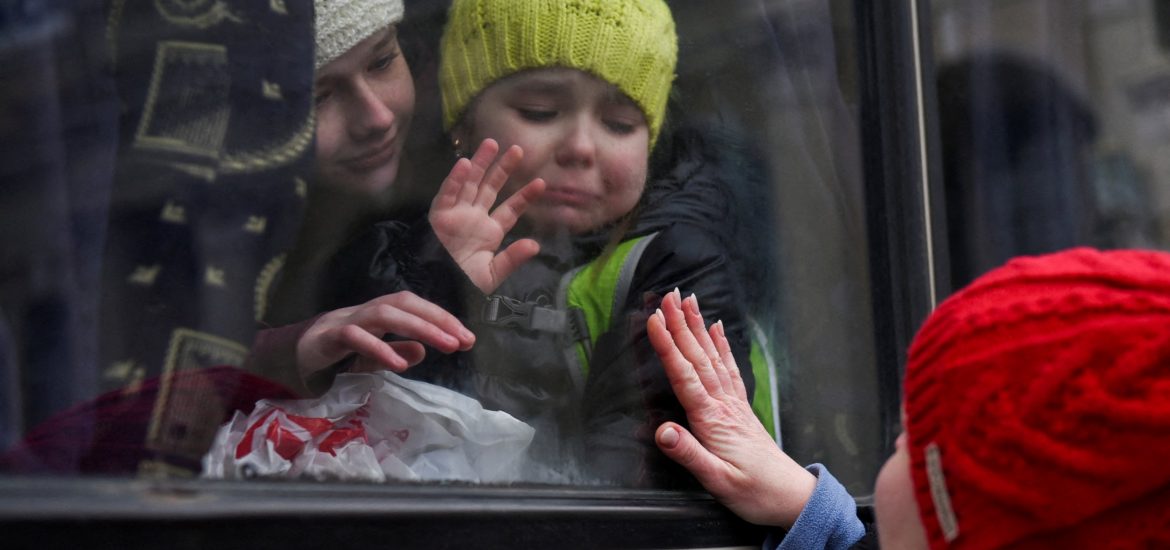There are few experiences more distressing and traumatizing than being forced to leave home, and to flee somewhere, anywhere, that may offer physical safety from war. The endless calculations involved are exhausting: whether it is worth putting loved ones in further danger, fears of if the journey can be endured, and the sense of uncertainty for the future. At the heart of these deliberations are whether it would, ultimately, be the right choice for the children. Ukraine has become the European flashpoint of an explosion of refugees due to the war with Russia. A tragedy within this tragedy is that of children made vulnerable because of this conflict.
The UN has recognized the refugee crisis brought about by the month-long war, with over three million Ukrainians having fled the country. Among these refugees are a shocking 1.5 million children since the Russian invasion began on 24 February. James Elder, spokesperson for the UN Children’s Fund, said: “Every day, over the past 20 days, in Ukraine more than 70,000 children have become refugees. That’s every minute, 55 children fleeing the country.” (UN News)
These young people have no understanding of the conflict and no means with which to insulate them from the disruption and distress inflicted on them. All of them will be leaving the homes they have known all their young lives. There will be different groups of children, some of whom have fled Ukraine and are trying to get into another country, or those that are stuck in Ukraine but have already fled their locality or wish to. As the UN Refugee Agency (UNHCR) notes: “Amongst those fleeing, many are unaccompanied or have been separated from their parents or family members. Children without parental care are at a heightened risk of violence, abuse and exploitation. When these children are moved across borders, the risks are multiplied. The risk of trafficking also soars in emergencies.” (UNHCR)
At the root of the Buddhist response to the crisis of displaced children is compassion, pure of motivation and free from political calculation. Sorrow and anguish, especially when endured by children, is deplorable. Buddhist communities and leaders around the world have reacted with dismay to the Ukraine war, but there needs to be a renewed focus on the plight of children, who are vulnerable to horrors like trafficking, abuse, and violence, not to say the trauma of the war itself. Many girls and boys will be shellshocked by bombing, gunfire, and other sounds and sights of war. They will have witnessed their parents in visceral fear for their lives, scrambling to send them somewhere safe while doing their best to keep a calm and comforting face for their sake. Some are unfortunate enough to lose their parents to a battle or bombing, or be sent away so that their mothers or fathers can stay behind to fight. Finally, over each of these children’s hangs the question of their future and wellbeing, including adjusting to a new environment away from Ukraine, emotional healing, and health and schooling.
Many Buddhist responses have been concentrated in Poland, in part due to its geographical proximity with Ukraine and the Polish government’s coordinated response to the war-caused border crisis. The government has charted a path for Ukrainian refugees, and over 2 million Ukrainians – a large majority of displaced refugees – have been reported to have crossed the Polish-Ukrainian border by 18 March 2022 (European Commission). In Krakow, the Triratna Buddhist Order’s center, Sanghaloka, opened up to provide refugees arriving at Krakow Central Station with overnight food, shelter, and clothing. Buddhist volunteers also helped to provide funds for transit travel or accommodation. Meanwhile, the Tzu Chi Foundation has also launched a campaign called “Love & Compassion for Ukraine,” connected Buddhist volunteers with local agencies and partners along the Polish-Ukrainian border to provide supplies such as food, medical supplies, personal care items, and eco-blankets.
Other countries accepting large numbers of refugees have included Hungary, Moldova, Romania, and Slovakia, as well as Russia. On their way to and within these countries, refugee children risk being trafficked, kidnapped, or abused. It is critical that the ongoing Buddhist response take into account the plight of these children, as well as those trying to escape the horror of war by arriving in Poland. Preventing mistreatment of these vulnerable children, and providing education and tools to assist their transition back to a normal life, will be essential goals in the months and even years to come.
War is horror. It is especially terrifying for young hearts to see the ugly side of human nature magnified, a ravenous maw of insatiable violence and viciousness consuming their homes, families, and friends. It is not only the Ukraine war, but wars around the world, waged by many different countries, that create waking nightmares and lifelong ordeals that haunt these children all the way to adulthood, sometimes to their dying days. The existence of vulnerable children – trafficked, abused, and maltreated children – is a devastating failure of the people that embody our future, on part of all of us that know better. Buddhists will need reliable sources of information, comprehensive analyses, and pragmatic toolkits to address this urgent problem.
See more
Unaccompanied and separated children fleeing escalating conflict in Ukraine must be protected (UNHCR)
Ukraine war creating a child refugee almost every second: UNICEF (UN News)
Offering a home to Ukrainian refugees (Triratna)
Related news from Buddhistdoor Global
Polish Buddhist Center Offers Refuge to Nepalis Fleeing Ukraine
Engaged Buddhism: Buddhist Tzu Chi Foundation Responds to Ukraine Refugee Crisis
A Call for Peace and Action: Ven. Pomnyun Sunim Appeals for Restraint in Ukraine
Dalai Lama Expresses Sadness Over Ukraine Crisis
Prayers for Peace: Spiritual Leaders and Communities Respond to the Humanitarian Crisis in Ukraine
Related features from Buddhistdoor Global
Buddhistdoor View: What Is Lost when Warmongers Win?
Buddhistdoor View: Praying for Ukraine Across Religious Identities
Related blog posts from Tea House
A Buddhist Prayer for Peace in Kyiv


